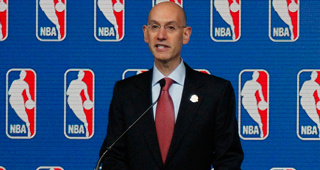After taking a public stand against North Carolina's discriminatory "bathroom bill" by moving the 2017 All-Star Game from Charlotte to New Orleans, the NBA has already announced its return for the 2019 game.
The move drew criticism from a number of respected advocates on LGBT issues.
"There wasn’t a burning issue," said Adam Silver when asked by ESPN's Kevin Arnovitz. "The situation we had in Charlotte is of course we had already awarded the All-Star Game for 2018, and it was a function of the years. At the time we moved the All-Star Game, we had said to the legislative leaders that we will consider coming back in 2019 if you change the law."
Silver was asked by Arnovitz a follow-up on whether he feels like the law was changed sufficiently.
"Well, that’s a great question. The law was changed. Sufficient is a tough — the answer is yes, I felt that they made incremental progress. And I felt in part related to my response to the last question, I think there is a role that the league can play in demonstrating what equality looks like to a community. I think there that a new governor came in, certainly he made the request directly to us that if they could make progress with the legislature, would we be willing to bring the game back.
"I think to your point that trying to measure precisely whether it was enough progress, we ultimately felt it was. I respect those who feel we may have made the wrong decision, but I disagree factually for those who say that the change in the law was not an improvement, or some even said was worse. The fact is that under the change in the law in North Carolina, birth certificates were no longer required to use restrooms, and it also permitted us to take our All-Star Game to Charlotte and set a set of rules, a set of principles in which we were going to operate under in that state.
"Again, these are close calls for the league, but I think ultimately it’s that expression that sport imitates life. I think sometimes life can imitate sport. And I think that we can be in a position where we go in and say, this is what it looks like to operate under a set of egalitarian principles, and this is what it looks like to be nondiscriminatory, in this case against the LGBTQ community. And my hope is by setting that example, we can unify people and that the state will follow."


